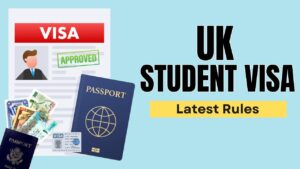Get the latest 2025 UK visa application updates for tourists, students, and work permits with clear guidance on eligibility and process changes.
United Kingdom remains one of the most sought-after destinations worldwide for travelers, students, and professionals, owing to its rich history, diverse culture, and world-class educational and employment opportunities. UK visa application process can seem daunting due to strict immigration policies and frequent updates.
In 2025, the government has introduced new regulations and technological improvements that applicants must understand to avoid delays and refusals. This provides a detailed overview of the latest guidelines for tourist, student, and work permits to help you successfully navigate your UK visa application.
Overview of the UK Visa Application Process
The UK structures its visa system to suit different travel purposes like tourism, study, and employment, each with specific eligibility criteria and procedures. The Home Office manages applications using a points-based system for work visas, while visitor and student visas follow tailored rules. You must carefully choose the correct visa category aligned with your purpose, as applying under the wrong category leads to rejection.
UK Student Visa Latest Rules 2025: Breakdown of the Latest Rules
In 2025, the UK government has launched new digital tools to streamline the application process, including online portals and virtual interviews for certain visa types. Despite these improvements, you must prepare comprehensive and accurate documentation. Incomplete paperwork or insufficient proof of funds will cause delays or refusals.
UK Visa Application for Tourists
Purpose and Visa Types for Tourists
The Standard Visitor visa allows individuals to stay in the UK up to six months for tourism, attending family events, short business trips, or private medical treatment. Tourists must not work or access public funds during their stay. The marriage visitor visa lets those planning to marry or enter a civil partnership in the UK apply separately and also lasts six months. Applying for the correct visitor visa based on your plans ensures compliance with immigration rules.
Eligibility and Documentation
You must prove your visit is temporary and demonstrate strong ties to your home country, such as employment, property, or family responsibilities. You also need to show sufficient funds to support your stay without working. Provide documents like a valid passport, six months of bank statements, travel itinerary, accommodation details, and invitation letters if visiting friends or family. Adding a cover letter explaining your visit’s purpose and duration strengthens your application.
Application Process and Timelines
Start your application online through the UK government portal by providing personal details, travel history, and purpose of visit. After submitting your form and paying the visa fee, schedule a biometric appointment to provide fingerprints and photographs. The process generally takes about three weeks but can take longer during busy periods or if extra documents are requested. Apply at least eight weeks before traveling, or use priority services for faster processing at an extra cost.
UK Visa Application for Students
Types of Student Visas
The Student visa is for those accepted into a Home Office-licensed UK education provider, covering degree courses, postgraduate study, and vocational programs longer than six months. Short-term Study visas allow stays of 6 to 11 months for shorter courses. Some professional training and language courses qualify for student visas if the provider is licensed. Graduates may apply for post-study work visas like the Graduate visa or Doctorate Extension Scheme to gain UK work experience after finishing studies.
Eligibility Criteria
You must obtain a Confirmation of Acceptance for Studies (CAS) from your institution, which provides a reference number required for your visa application. You need to prove you have enough funds to pay tuition, living costs, and travel. The financial requirements vary by course length and location, with London students facing higher thresholds. You must also pass an approved English language test unless exempt and have no criminal record or security concerns. Declare your intention to leave the UK after your studies unless applying for further visas.
Required Documents
Submit your passport, CAS, bank statements or sponsorship letters, academic transcripts, and English proficiency certificates. Some nationalities require tuberculosis test results. Provide proof of accommodation and travel plans, and minors may need parental consent letters.
Application Process
Complete your application online, pay the visa fee plus the Immigration Health Surcharge (IHS), and attend biometric enrollment. Some applicants may face interviews or extra documentation requests. Student visas allow part-time work during terms (up to 20 hours per week) and full-time work during holidays. After graduation, you may apply for a Graduate visa to work in the UK.
UK Visa Application for Work Permits
Categories of Work Visas
The Skilled Worker visa serves professionals with job offers from licensed UK sponsors. Other visas include the Global Talent visa for exceptional leaders, the Health and Care Worker visa for NHS staff, and Temporary Worker visas for short-term jobs like charity work or creative roles. Each visa has specific job, duration, and qualification requirements. Employers must hold sponsorship licenses and meet salary and skill thresholds.
Skilled Worker Visa Eligibility
To qualify, you must have a job offer listed on the Home Office’s eligible occupations list and a Certificate of Sponsorship (CoS) from your employer. The job must meet minimum skill and salary requirements—usually £26,200 per year or £10.75 per hour, with exceptions for shortage occupations and new entrants. You must also meet English language requirements and prove personal savings if relocation costs are not covered.
Required Documentation
Provide your passport, CoS reference, employment contract, proof of salary, English proficiency certificates, and evidence of funds. Medical certificates or TB tests may apply depending on your country. Authorities might also request criminal records or immigration history.
Application and Processing
Submit applications online, provide biometrics, and pay fees. Priority processing is available. Skilled Worker visas allow dependents to accompany you, who may work or study. You can switch jobs within the same category under certain conditions and apply for permanent residency after five years. Maintaining lawful status is essential to benefit from these options.
Key 2025 Updates to the UK Visa Application Process
Enhanced Digital Application System
The UK Home Office upgraded its digital platform in 2025 to reduce paperwork and speed processing. Applicants now upload documents online, track applications in real-time, and may attend virtual interviews. These tools improve convenience but require digital literacy and reliable internet access.
Updated Fee Structure
Visa fees have increased slightly to cover administrative costs and inflation. For example, the Student visa fee rose marginally. Always check official UK government websites for the latest fees to avoid rejection due to incorrect payments.
Stricter Compliance and Security Checks
The government has strengthened identity verification and document authenticity checks to prevent fraud. While these measures can slow processing, they ensure a safer, more trustworthy system.
Post-Brexit Immigration Adjustments
Post-Brexit, the points-based system applies equally to EU and non-EU nationals. This simplifies rules but increases competition for skilled work visas. Focus on meeting or exceeding qualifications, salary, and language skills to enhance your chances.
Practical Tips for a Successful UK Visa Application
- Apply Early: Start your UK visa application well in advance of your planned travel date to allow time for additional document requests or unexpected delays.
- Complete and Accurate Documents: Ensure all documents are complete, accurate, and translated into English if required.
- Meet Language Requirements: Take official English language proficiency tests well ahead of time to meet the visa requirements.
- Provide Clear Financial Evidence: Submit clear and sufficient financial documents to prove you can support yourself without relying on public funds.
- Use Official Resources: Regularly check the UK Home Office website for the latest updates on policies, fees, and application procedures.
- Seek Professional Advice: For complicated cases or uncertainties, consult registered immigration professionals to avoid mistakes and smooth the process.
How to Get a UK Visa Fast: Step-by-Step Guide for Quick Approval
By following the detailed guidance in this article, aligning your application with the latest criteria, and preparing all necessary evidence, you can increase your chances of success. Aim to visit the UK for tourism, education, or employment, staying informed and organized will make your journey smoother and more rewarding.
FAQs
1. What types of visas can I apply for to visit the UK?
You can apply for a Standard Visitor visa for tourism, business meetings, or medical treatment, a Student visa for education, or a Skilled Worker visa for employment. Each visa serves different purposes and has distinct requirements.
2. How do I know which UK visa category suits my purpose?
Identify your main reason for traveling—tourism, study, or work—and select the visa type that matches it. Applying under the correct category is essential to avoid refusal.
3. What documents do I need to submit with my UK visa application?
Generally, you need a valid passport, proof of funds (like bank statements), a travel itinerary, and specific documents like a Confirmation of Acceptance for Studies (CAS) for students or a Certificate of Sponsorship (CoS) for work visas.
4. How long does the UK visa application process take?
Processing usually takes about three weeks but can vary. Applying at least 8 weeks before your travel date helps avoid delays. Priority services can speed up the process for an extra fee.
5. Can I work in the UK on a tourist visa?
No. Tourist visas strictly prohibit working. To work legally, you must apply for the appropriate work visa.
6. What proof of financial means is required for a UK visa?
You must show enough money to cover your stay without working or accessing public funds. This usually means bank statements covering at least six months or official sponsorship letters.
7. Are biometric details mandatory for UK visa applications?
Yes. You must provide biometric information such as fingerprints and photographs at a visa application center as part of the application process.
8. How has the UK visa process changed in 2025?
The UK has enhanced its digital platform to allow online document submission, real-time status tracking, and virtual interviews, making the process more efficient but requiring digital literacy.
9. What is the points-based system for UK work visas?
Applicants earn points based on criteria like job offer, salary, skills, and English language ability. Meeting the points threshold is mandatory to qualify for a Skilled Worker visa.
10. Can I bring my family with me on a UK work visa?
Yes. Dependents such as spouses and children can usually join you and are allowed to work or study in the UK, depending on the visa conditions.






